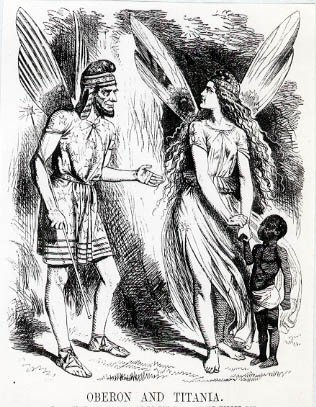
Oberon, also Auberon, King of Darkness, is best known as a character in William Shakespeare's play, A Midsummer Night's Dream, written in the mid-1590s. Oberon gives his wife, Titania, a potion that causes her to fall in love with Bottom in order to get the changeling, who was given to Titania by her dying maid.
The medieval concept of the character Oberon arose from a multitude of earlier sources:
Merovingian legend:Oberon's status as king of the elves comes from the character of Alberich (elbe "elves" reix, rex "king"), a sorcerer in the legendary history of the Merovingian dynasty. In the legend, he is the otherworldly "brother" of Merowech, whose name is the eponym of the Merovingians. Alberich wins for his eldest son Walbert the hand of a princess of Constantinople. In the Nibelungenlied, a burgundian poem written around the turn of the 13th century, Alberich guards the treasure of the Nibelungen, but is overcome by Sigfrid.
Other historical references: In 1610, Ben Jonson wrote a masque of Oberon, the Fairy Prince. It was performed by Henry Frederick Stuart, the Prince of Wales, at the English court on New Year's Day, 1611. In 1826, Carl Maria von Weber's opera, Oberon, or the Elf-King's Oath (written after a poem by Christoph Martin Wieland) debuted at Covent Garden in London. In the four operas of 1854 to 1874 by Richard Wagner, The Ring of the Nibelung, his role evolves in the opposite direction and he winds up stealing the Rhinemaidens' gold. Notably, the name Oberon was also chosen for Uranus outermost natural satellite in 1847, as an homage to William Shakespeare and his literary character.
(Download)
(Download)
(Download)
